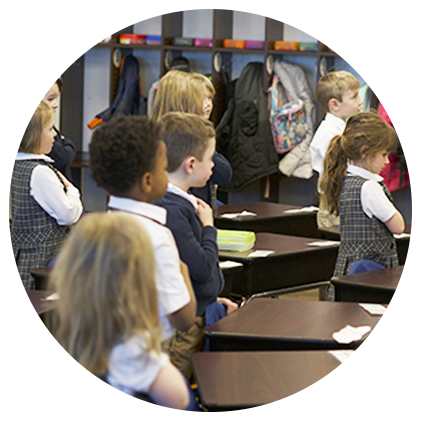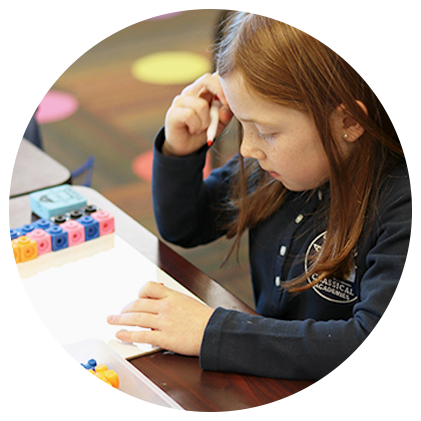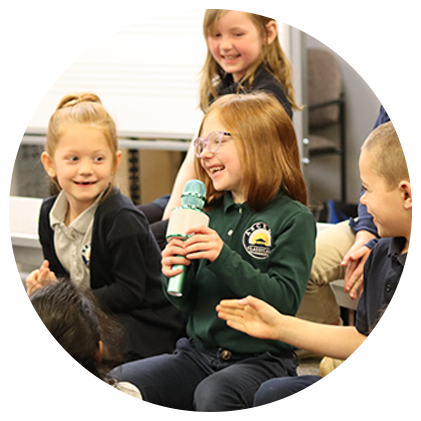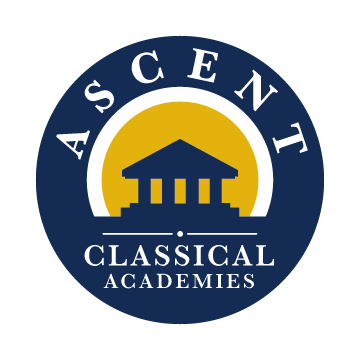Rarely does a public school speak openly about virtue, since virtue means we judge our actions against an objective standard of beauty or goodness. Today, most people prefer language that does not discriminate between good and bad, emphasizing values rather than virtues. To speak of virtue means we judge some qualities of character to be better than others, taking a stand in their defense and attempting to cultivate them in our students.
Introduction to Ascent’s Core Virtues
Ascent Classical™ guides students, parents, and faculty in the development of mind, body, and soul through integration of seven Core Virtues with our academic program. These include the virtues of Courage, Moderation, Justice, Responsibility, Prudence, Friendship, and Wonder. Students in Kindergarten and First Grade will be introduced to these concepts and learn how to consider and incorporate them into their daily routines. By introducing our Core Virtues at a young age, we set the groundwork for students to practice how to live with one another in community and, ultimately, grow into young men and women of character.


Explicit phonics Instruction
Explicit phonics is a staple of the Ascent Classical™ curriculum. Lower grammar school students are introduced to the relationship between symbols and sounds in the English language rather than a list of sight words. Through this method of learning, students are taught the “basic code” of English which consists of 72 phonograms and 43 elementary sounds. This curriculum – which requires students to hear, say, and write phonemes at the same time – develops habits of care, neatness, and patience from an early age.
Number Sense Progression
Over the course of the first year, Kindergarten students will learn numbers up to one hundred as well as number sets and orders using Singapore Math. In First Grade, students expand upon this knowledge and begin to learn addition, subtraction, multiplication, and division. Singapore Math is a cohesive, deep, and focused mathematics curriculum, for Kindergarten through Seventh Grade, designed to develop algebraic thinking. The Singapore Math curriculum presents math problems first concretely, then pictorially, and only after these steps in abstract terms that we recognize as an algorithm. The benefit of this multiple representation approach, which treats the algorithm as present all along but not uncovered immediately, is the principal way in which Singapore Math develops number sense.


Classical Fairy Tales and Nursery Rhymes
We draw on myths and fairytales from our curriculum to help our students orient themselves to, and understand, today’s world through the lens of classical storytelling. Some of our students’ favorite tales include Aesop’s Fables, Goldilocks, The Princess and the Pea, and Peter Rabbit. Literature is important for our lower grammar school students as it allows them to explore decisions without suffering consequences. By placing themselves in the narrator’s purview, they can explore important decisions without suffering consequences. When students read The Ugly Duckling, they can experience how it feels to be excluded because of their differences in the safety of the classroom setting and learn the importance of kindness toward their peers.
Introduction to History, Geography, and Science
At Ascent, we introduce students to the history of our country and the founding of our nation through studies in history and geography. We instill a love of patriotism in our students every day, beginning with the recitation of the Pledge of Allegiance and followed by our school pledge to “learn the true, do the good, and love the beautiful.” In science, students in Kindergarten and First Grade are taught basic scientific principles as they relate to their day-to-day lives including varieties of plants, species of animals, the four seasons, and the phases of the sun and moon.


Daily Instruction in Fine Arts and Physical Education
Students receive daily instruction in fine arts, beginning with a historical overview of different kinds of art from around the world, including ancient Egyptian and Mesopotamian art before delving into traditional artistic styles from portraiture to landscape. During Physical Education classes, students practice spatial awareness of their bodies and build the skill of teamwork. In early grammar school especially, fine arts and physical education are areas in which students may explore the virtue of Wonder.
Ascent Classical™ curriculum is designed to build upon itself, which is why we encourage families to enroll their students at Ascent Classical™ Academy as soon as possible and ideally in either Kindergarten or First Grade. This gives students the best opportunity to grasp concepts that are designed to develop alongside their learning, as when students progress to further grades at Ascent Classical™, the complexity of concepts discussed also progresses.
One example of this can be seen through the study of the four seasons. In Kindergarten, students are taught about the four seasons, and in upper grammar school, they learn about the earth’s axial tilt which causes seasonal change. In upper school, students study the topic once more when they learn about the celestial mechanics of plants in orbit around a star.
We encourage you to attend a Parent Information Meeting to learn more about the Ascent Way or complete an application for your student today.
